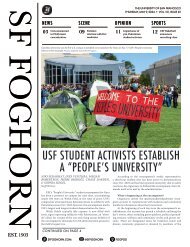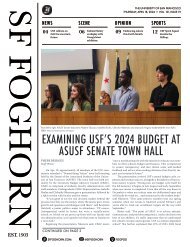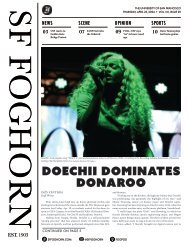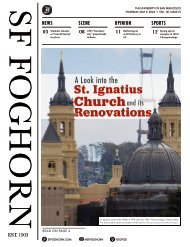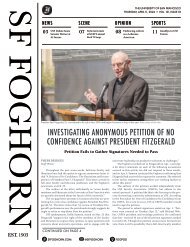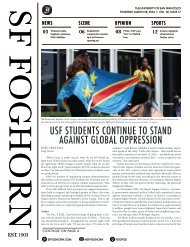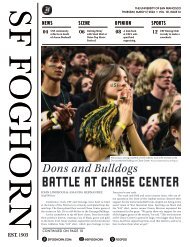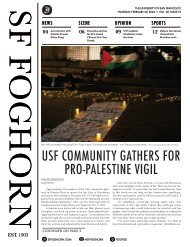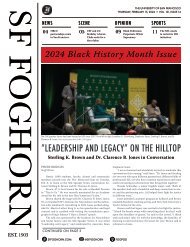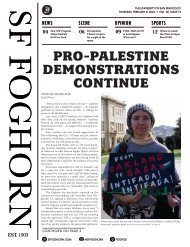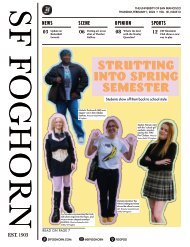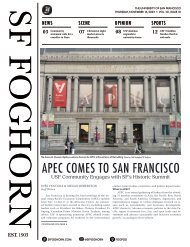Create successful ePaper yourself
Turn your PDF publications into a flip-book with our unique Google optimized e-Paper software.
02 03<br />
THURSDAY<br />
SEPT 28.<br />
2023<br />
STAFF<br />
Editor in Chief<br />
MEGAN ROBERTSON<br />
mrrobertson2@dons.usfca.edu<br />
News Editor<br />
NIKI SEDAGHAT<br />
nisedaghat@dons.usfca.edu<br />
Opinion Editor<br />
CHISOM OKORAFOR<br />
cokorafor@dons.usfca.edu<br />
Scene Editor<br />
JORDAN PREMMER<br />
jepremmer@dons.usfca.edu<br />
Sports Editor<br />
CHASE DARDEN<br />
cbdarden@dons.usfca.edu<br />
Photography Editor<br />
LEILA TSELNER<br />
latselner@dons.usfca.edu<br />
General Reporter<br />
INÉS VENTURA<br />
ipventura@dons.usfca.edu<br />
General Reporter<br />
JORDAN TYLER MARALIT<br />
jcmaralit@dons.usfca.edu<br />
415.422.5444<br />
sffoghorn.com<br />
SUBMISSION POLICY<br />
The San Francisco Foghorn is the<br />
official student newspaper of the<br />
University of San Francisco and<br />
is sponsored by the Associated<br />
Students of the University of San<br />
Francisco (ASUSF).<br />
The thoughts and opinions<br />
expressed herein are those of the<br />
individual writers and do not<br />
necessarily reflect those of the<br />
Foghorn staff, the administration,<br />
the faculty, staff or the students of<br />
the University of San Francisco.<br />
Contents of each issue are the sole<br />
responsibilities of the editors.<br />
An All-American<br />
Publication<br />
ad maiorem dei<br />
gloriam<br />
The San Francisco Foghorn is free<br />
of charge.<br />
Advertising matter printed herein<br />
is solely for informational purposes.<br />
Such printing is not to be construed<br />
as written or implied sponsorship<br />
or endorsement of such commercial<br />
enterprises or ventures by the San<br />
Francisco Foghorn.<br />
©MMIV-MMV, San Francisco<br />
Foghorn. All rights reserved. No<br />
material printed herein may be reproduced<br />
without prior permission<br />
of the Editor in Chief.<br />
SAN FRANCISCO<br />
<strong>FOGHORN</strong><br />
Freedom and Fairness<br />
Managing Editor<br />
JORDAN DELFIUGO<br />
jgdelfiugo@dons.usfca.edu<br />
Copy Editor<br />
OLIVER RIVER SATALICH<br />
omriversatalich@dons.usfca.edu<br />
Layout Editor<br />
AVA LORD<br />
ajlord@dons.usfca.edu<br />
Layout Editor<br />
ANYA JORDAN<br />
arjordan@dons.usfca.edu<br />
Social Media Manager<br />
MARIA ZAIED<br />
mfzaied@dons.usfca.edu<br />
Online Editor<br />
ESHA DUPUGUNTLA<br />
ekdupuguntla@dons.usfca.edu<br />
ADVISOR<br />
TERESA MOORE<br />
2130 FULTON STREET, UC #417<br />
SAN FRANCISCO, CA 94117<br />
Columns for the Opinion section<br />
and Letters to the Editor are gladly<br />
accepted from students, faculty, staff<br />
and alumni.<br />
All materials must be signed and<br />
include your printed name, university<br />
status (class standing or title),<br />
address, and telephone number for<br />
verification. Anonymous submissions<br />
are not published.<br />
We reserve the right to edit materials<br />
submitted. All submissions<br />
become the property of the San<br />
Francisco Foghorn.<br />
Staff editorials are written by the<br />
Foghorn editorial staff and represent<br />
a group consensus.<br />
The San Francisco Foghorn Opinion<br />
page is a forum for the free, fair and<br />
civil exchange of ideas. Contributors’<br />
opinions are not meant to<br />
reflect the views of the Foghorn staff<br />
or the University of San Francisco.<br />
Students interested in contributing<br />
to the Foghorn can scan and fill out<br />
the QR code below.<br />
STAFF EDITORIAL<br />
HONORING LATINE CULTURE<br />
THROUGH ADVOCACY<br />
The University of San Francisco is<br />
tied for first with Andrews University<br />
in campus ethnic diversity, according<br />
to the U.S. News & World Report 2024.<br />
USF can and should connect its students<br />
to progress-focused organizations and<br />
programs they may not have known<br />
about otherwise. It is imperative<br />
that USF’s partnerships are diverse<br />
in purpose so students can interact<br />
with all facets of their communities,<br />
especially as a celebration of their<br />
heritage and culture.<br />
According to College Factual,<br />
25.1% of USF’s full-time undergraduate<br />
population is Hispanic. University<br />
involvement with Bay Area Latine<br />
community organizations allows<br />
these students to develop leadership<br />
and service skills through community<br />
engagement. The hurdles Latine people<br />
face are as diverse as the community is,<br />
which is reflected by USF’s community<br />
partners.<br />
One such organization is Ayudando<br />
Latinos A Soñar (ALAS), a nonprofit<br />
working toward “social wellness<br />
through multicultural practices,<br />
mental health care, individualized<br />
and collective support related to<br />
education, immigration processes, and<br />
work,” according to their website. The<br />
organization advocates for and provides<br />
food and water to Half Moon Bay’s<br />
predominantly Latine farmworkers.<br />
USF’s involvement with ALAS<br />
started in the summer of 2020 when<br />
USF Program Coordinator for Catholic<br />
Educational Leadership Jane Bladesdale,<br />
along with her doctoral student<br />
Mauricio Diaz De Leon, helped tutor<br />
Latine children to literacy gaps fueled<br />
by pandemic-related school closures.<br />
The University Ministry supports<br />
farmworker families in Half Moon Bay<br />
with weekly tutoring sessions.<br />
At the School of Law’s<br />
Immigration & Deportation Defense<br />
Clinic, law students work closely with<br />
unaccompanied minors and families<br />
to guide them through removal<br />
proceedings, asylum hearings, and<br />
interviews. According to the School of<br />
Law website, “The majority of clients<br />
are seeking asylum and come from the<br />
Northern Triangle in Central America<br />
and Mexico.”<br />
At the School of Law’s Immigration<br />
Policy Clinic, students learn about<br />
and assist with immigration policy<br />
changes. Through the clinic, students<br />
educate people about their rights,<br />
advise lawmakers in creating effective<br />
immigration legislation, and partner<br />
with the Catholic Legal Immigration<br />
Network to assist detainees appealing<br />
to the Board of Immigration Appeals.<br />
For students outside the School<br />
of Law, there are still opportunities to<br />
get involved with the work these clinics<br />
do. According to USF’s Solidarity<br />
in Action website, the Immigration<br />
and Deportation Defense Clinic has<br />
opportunities for Spanish-speaking<br />
students to “help with interpreting<br />
during asylum interviews, interpreting<br />
during psychological evaluations<br />
and translating Spanish documents,”<br />
among other things.<br />
The Leo T. McCarthy Center for<br />
Public Service and the Common Good<br />
is another hub of student activism<br />
at USF, hosting many programs in<br />
which students interact directly with<br />
policymakers and potential voters.<br />
It’s hard to effectively incorporate<br />
activism into a busy schedule, but<br />
all students should be able to find<br />
opportunities that reflect their unique<br />
ways of activism. It is essential that<br />
USF continues to offer diverse avenues<br />
toward community engagement, so<br />
that during Hispanic Heritage Month<br />
and beyond, students can honor their<br />
culture through advocacy.<br />
ALAS hosts cultural events for the Half Moon Bay Latine community. Photo courtesy of the Half Moon<br />
Bay Review.<br />
FREE HEALTHCARE IN THE MISSION<br />
KYLA MENCONI<br />
Staff Writer<br />
An estimated three million Californians are at risk of losing<br />
their health insurance as residents will have their Medi-Cal eligibility<br />
reconsidered in the coming months, according to ABC7. As of June,<br />
approximately 225,000 Medi-Cal recipients have already lost their<br />
coverage after reconsideration, according to the California Department<br />
of Health Care Services (DHCS). The advocacy group Latino Coalition<br />
for a Healthy California found that of those who have been disenrolled<br />
from Medi-Cal during the reconsideration process, 53% identify as<br />
Latine, the most of any other racial or ethnic population.<br />
According to California Health and Human Services, Medi-Cal<br />
reviews member eligibility once a year to see whether the applicant’s<br />
property and assets exceed the eligibility limit, which was paused<br />
during the COVID-19 public health emergency. On May 11, the process<br />
resumed. On Aug. 16, CBS reported that 150,000 people across the Bay<br />
Area will have their Medi-Cal eligibility reconsidered.<br />
Latine sophomore nursing major Alejandro Marquez is one<br />
of these Medi-Cal recipients. He said, “I got something in the mail<br />
yesterday that it’s going to be reconsidered… [Medi-Cal] helps people<br />
access healthcare.”<br />
Clinica Martín-Baró, a free healthcare clinic in the Mission<br />
District, is an alternative resource that those who have lost their<br />
insurance can use. The clinic’s mission is “to promote wellness and<br />
address the health care needs of the underserved and economically<br />
disadvantaged Spanish-speaking<br />
community of the Mission District,”<br />
according to their website. All of the<br />
clinic’s services, including primary<br />
care, specialist referrals, and<br />
medication, are free.<br />
The clinic’s multiple<br />
partnerships, including San<br />
Francisco State University’s (SFSU)<br />
department of Latina/Latino<br />
Studies and members of University<br />
of California, San Francisco Health<br />
(UCSF), fund its efforts.<br />
UCSF and SFSU students run<br />
the clinic. SFSU alumni Dr. Caro<br />
Monico and Dr. Zoel Quinonez<br />
opened the clinic in 2007 during<br />
their time at UCSF.<br />
Latine sophomore nursing<br />
major Dyrin Chavez Hernandez said,<br />
“I have heard of Clinica Martín-<br />
Baró here in SF. I love the work<br />
that they are doing for our Latine<br />
community in the Mission, and<br />
I hope to be able to volunteer for<br />
them in any way I can. Start-ups like<br />
these are extremely important to our<br />
communities.”<br />
Milagros Hernandez, who has<br />
been an intern at Clinica Martín-<br />
Baró since 2018, said, “Today, a<br />
patient that I hadn’t seen in a while<br />
recognized my name and gave me<br />
the biggest hug. They always leave<br />
saying thank you so many times.”<br />
As a Latine person, Hernandez<br />
said, “When I go on a health visit,<br />
I feel unseen. I used to have to<br />
translate through my parents, so I understand the cultural barrier<br />
when people come into Clinica Martín-Baró.”<br />
Representation for Latine people is important to Marquez.<br />
“Having more and more Latino representation in the medical industry<br />
is really cool to see, because it determined that Latino people are more<br />
than capable of achieving success in the medical industry.”<br />
The clinic’s name comes from Ignacio Martín-Baró, a Jesuit priest<br />
and scholar who fought for social justice. USF has its own program<br />
dedicated to the work of Martín-Baró — the Martín-Baró Scholar<br />
program, in which first-year students work to fight food insecurity<br />
by donating food to community organizations like the Richmond<br />
Neighborhood Center and the USF Food Pantry.<br />
USF nursing students also engage with various Bay Area<br />
community organizations. These include the Academic-Practice<br />
Partnership with Kaiser Permanente, Engage San Francisco and<br />
Veteran Affairs Nursing Partnership.<br />
For Latine sophomore nursing major Sima Sadaghini, partnerships<br />
between healthcare and the Latine community are “vital and needed.”<br />
Clinica Martín-Baró is open Saturdays for free healthcare services<br />
to community members. The clinic also has a resource list with<br />
information about COVID, housing and reproductive healthcare in<br />
the broader Bay Area.<br />
Megan Robertson, Jordan DelFiugo, Oliver River Satalich and Niki<br />
Sedaghat contributed to the reporting of this story.<br />
Clinica Martín-Baró opened in 2007 to provide free healthcare in the Mission District. Photo by Kyla Menconi / SF Foghorn<br />
NEWS





